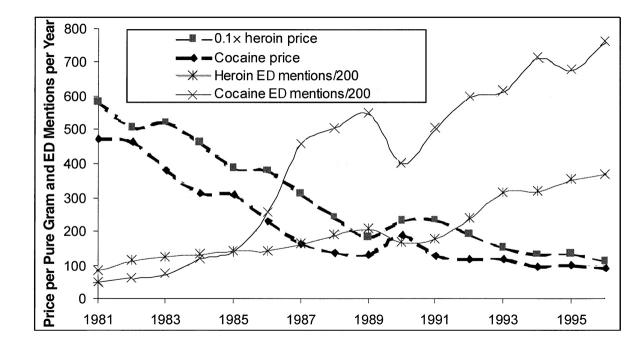back It isn't unexpected, either that they did it, or that they did it while everyone was distracted with the financial crisis...but we now have a cabinet level copyright czar to go with our drug czar. Let us hope that the war against copying will be as effective as the war on drugs.

(graph from the American Journal of Public Health)
The position of drug czar was created in 1982 (according to Wikipedia). The dark lines are the prices of cocaine and heroin which have been falling ever since. Does the creation of a "czar" position mean that they have given up hope?
Addendum: There is something else interesting in that graph. One industry that operates entirely without the "benefit" of patents and copyright is the illegal drug industry. Yet it is a very innovative industry. For starters, as can be seen in the graph, prices have dropped quite a bit - over 15 years by a factor of about 5 (a little more allowing for inflation). Few industries can match that. And we know that there have been significant innovations: the invention of crystal methamphetamine; rock cocaine; stronger strains of marijuana and so forth. And presumably there have been innovations in methods of smuggling drugs into the country. Clearly these have been widely imitated. Which brings up the question: maybe if the government legalized recreational drugs, but subjected them to the same type of patent restrictions as ordinary pharmaceutical products - the price would go up instead of down? [Posted at 10/13/2008 07:43 PM by David K. Levine on IP in the News  comments(10)] comments(10)]
Comments Do you have any price data for when those drugs first became illegal and sumptuary laws regarding them were being enforced?
(I would expect the price to shoot up around that time.)
-- Charles Iliya Krempeaux
http://changelog.ca/
[Comment at 10/13/2008 11:58 PM by Charles Iliya Krempeaux] A question. Since a comparison has been made between the drug czar and the copyright czar, would the copyright czar begin to employ the same tactics as those found in the war-against-drugs? The New York Times just recently reported " NATO Agrees to Take Aim at Afghan Drug Trade".
So will we be seeing the use of military force worldwide to seize illicit CDs and DVDs in the obscure corners of the world? Initially this may not be the case, but czar's attempt to aggrandize their power as demonstrated by expanding our efforts in Afghanistan to now include an anti-drug effort. Using the military as a US "police force" to enforce our laws outside of the US detracts from its mission of protecting the US.
Somehow I think that we would be spending more (money and lives) on these police efforts than the CDs/DVDs would be worth. In a free market system, it should not be the responsibility of the government to protect your business model. If you can't make money, too bad.
[Comment at 10/14/2008 05:55 AM by Steve R.] Don't know of a long time-series on recreational drug prices, nor the detailed of illegalization: it appears that marijuana was made illegal in 1937. That is consistent with my general impression that illegalization happened in between the two world wars.
The FBI already conduct overseas raids on "pirated" copies, so no new copyright czar is needed for that. [Comment at 10/14/2008 08:18 AM by David K. Levine] From a market entrepneural perspective, I think it is a boon and an opportunity for small guys. The RIAA/MPAA and powerful copyright interest, instead of focusing its energy on building new business models that survive the ravage of competition, instead they spent money lobbying the government, which will yield ultimately nothing.
As long as they don't attack the business models of enterprises that don't relies on copyright, they will only lose. It only serves to strengthen the business model of free culture. [Comment at 10/14/2008 12:22 PM by Kiba] Yes, Kiba, I'm with you on this. And I'll add that the more dangerous it is to infringe copyright, the more dangerous copyrighted works become to possess. People will start to consider (c) as a carcinogenic contaminant, effectively a curse. Ooh. A title for a blog article, "The Curse of Copyright". [Comment at 10/14/2008 12:35 PM by Crosbie Fitch] Where o where is the patent czar? Can he be far behind?
And what does trademark get, a czarina? [Comment at 10/14/2008 05:34 PM by Bill Stepp] Patent Potentate or Patent Pope?
Trademark Tyrant or Trademark Taoiseach? [Comment at 10/15/2008 01:19 AM by Crosbie Fitch] Copyright czar/czarina or copyright capo? [Comment at 10/15/2008 04:58 PM by Bill Stepp] At least it's clear that these privileges aren't granted, supervised, and protected by the people, their representatives, nor even by mother nature, but by unelected sovereign powers.
Folk have got to recognise that something very fishy is going on - sooner or later.
Even McCain is stunned to find out that he is inferior to the privilege of a mere copyright holder.
Will there be a coronation for copyright's new king? [Comment at 10/16/2008 01:25 AM by Crosbie Fitch] Of course not. Else how could we say "Where's your crown, King Nothing?" after a short time passes and BitTorrent fails to disappear? [Comment at 11/07/2008 02:32 PM by Nobody nowhere]
Submit Comment
Blog Post
|




